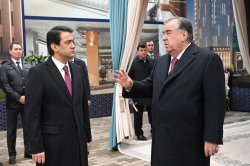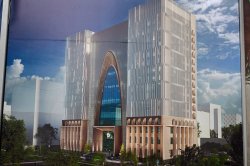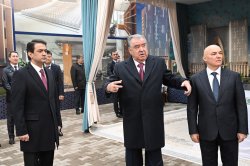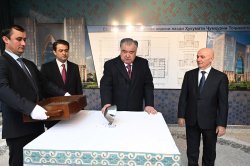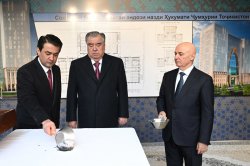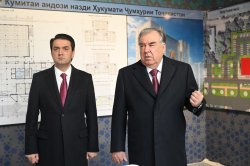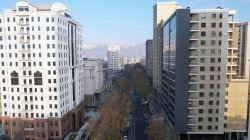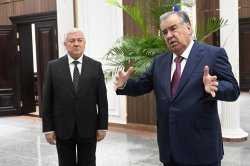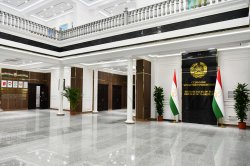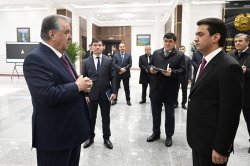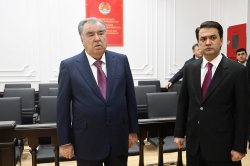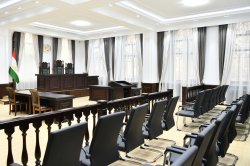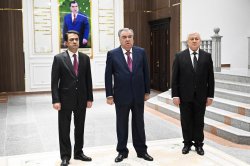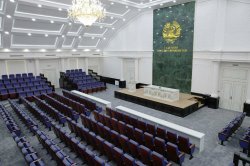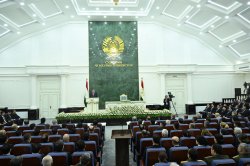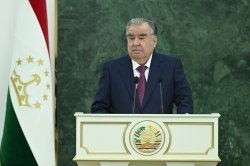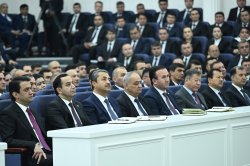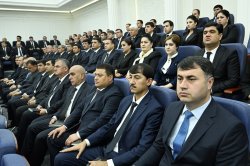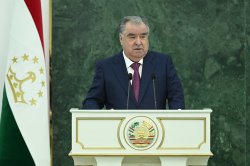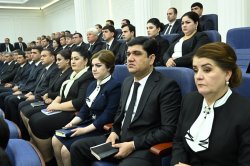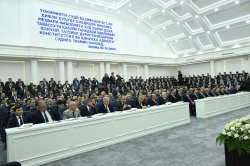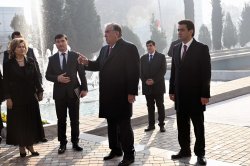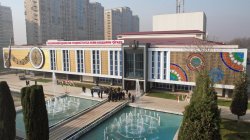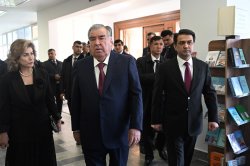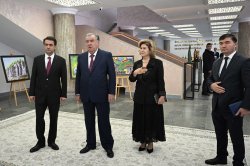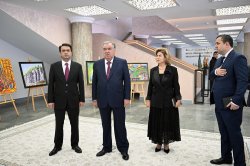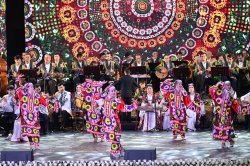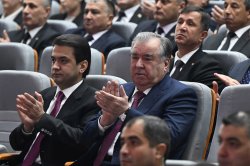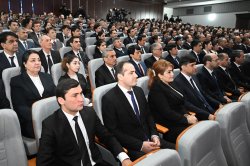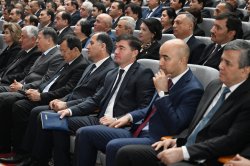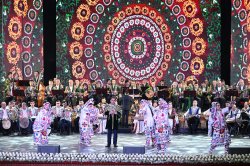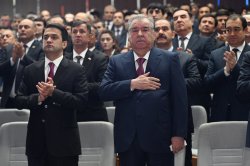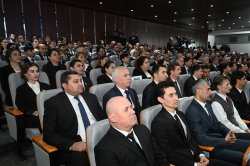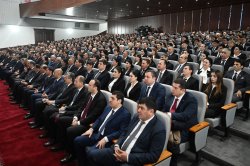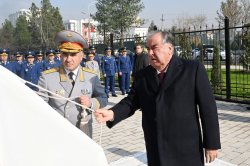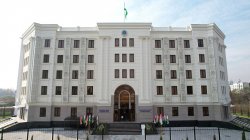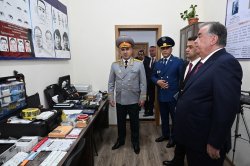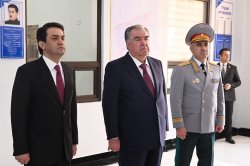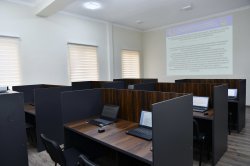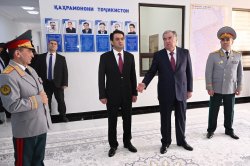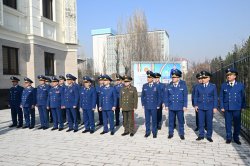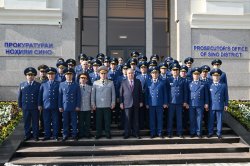LEADER OF THE NATION EMOMALI RAHMON LAID THE FOUNDATION STONE FOR THE CONSTRUCTION OF A NEW BUILDING OF THE TAX COMMITTEE
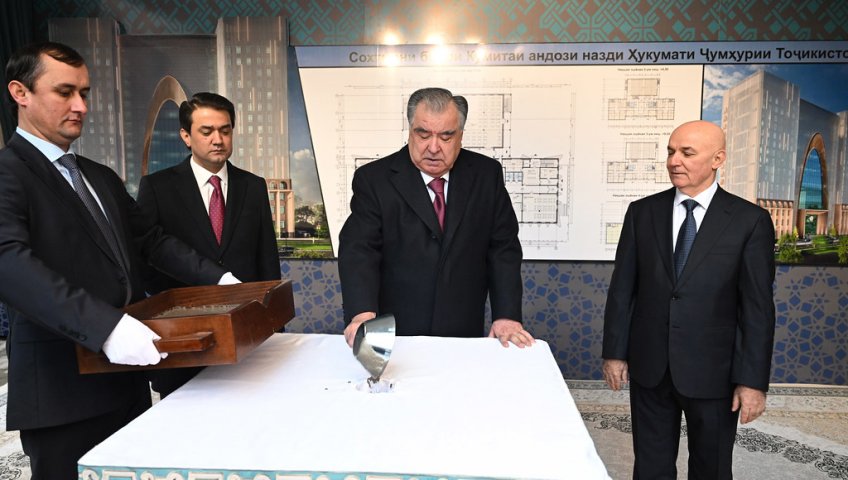
On December 5, the President of the Republic of Tajikistan, Leader of the Nation, Honorable Emomali Rahmon, and the Chairman of the Majlisi milli Majlisi Oli of the Republic of Tajikistan, Mayor of the city of Dushanbe, Honorable Rustami Emomali, laid the foundation stone for the construction of a new building of the Tax Committee under the Government of the Republic of Tajikistan in the Ismoili Somoni district of the capital.
During the familiarization with the project, the Head of State, Honorable Emomali Rahmon, was informed that the new head offices of the Tax Committee under the Government of the Republic of Tajikistan will consist of 4 buildings of 3 and 16 floors and a basement, and will have 12 spacious meeting rooms, a hall with 500 seats and a canteen with 160 seats.
The new building will be built on the basis of the general plan of the city of Dushanbe on an area of 9 thousand 145 square meters, and its courtyard will be decorated in accordance with the project requirements.
The facility under construction will house 15 departments and 36 divisions of this committee, and 360 employees will work there. This building will also have 6 modern elevators.
In addition to spacious office rooms with modern amenities, an underground parking lot for 230 cars will be built in the basement of the building.
The new building of the Tax Committee under the Government of the Republic of Tajikistan will provide opportunities to improve the quality of services to taxpayers in accordance with modern requirements and enhance the efficiency of tax authorities.
This project will be implemented taking into account the requirements of modern architecture and urban planning. The structure will include elements that reflect the history and exemplary culture of the Tajik people and will reflect the prosperity, stability and progress of Tajikistan during the country's independence.
The building of the Supreme Court consists of 15 floors, and its construction was carried out by the Directorate for the Construction of Government Facilities of the Executive Office of the President of the Republic of Tajikistan at a cost of about 185 million somoni from budget funds, with high quality and in compliance with construction standards.
The Head of State was informed that the new building of the Supreme Court has 171 working rooms, a conference hall with 400 seats, 8 court hearing halls, an archive of court cases, rooms for receiving citizens, a place for holding defendants, a press-conference hall, a traditional and electronic library, a canteen and other auxiliary facilities, and all rooms are equipped according to the required standards.
The Leader of the Nation, Honorable Emomali Rahmon, during his acquaintance with the capabilities of the new building, highly appreciated the quality of construction work, calling the facility a worthy gift from the Government of the Republic of Tajikistan to the country's judicial staff on the occasion of the 35th anniversary of the State Independence of the Republic of Tajikistan.
During his visit to the new building of the Supreme Court, the Head of State, Honorable Emomali Rahmon, noted that, using the created conditions, employees of the judicial authorities are obliged to properly protect the rights and freedoms of individuals and citizens, the interests of the state, organizations and institutions, legality and justice, and ensure the rule of law.
The construction of a new and modern building of the Supreme Court of the Republic of Tajikistan on one of the central streets of the country's capital will add more beauty to Dushanbe and is a logical continuation of the practical implementation of the constructive policy of the highest political leadership of Tajikistan and the capital's municipality.
It should be noted that the former building of the Supreme Court of the Republic of Tajikistan, located on Nemat Karaboev Street, was put into operation as a cultural hall in the 1970s and did not fully meet the requirements of the judicial authorities. The lack of working rooms, courtrooms, meeting rooms and other facilities led to the construction of a new building of the Supreme Court, under the guidance and instructions of the Leader of the Nation, Emomali Rahmon. This initiative of the Leader of the Nation was warmly welcomed by the country's judicial authorities.
It should be noted that the Government of the country is constantly taking practical measures to ensure the independence of the judiciary by increasing the working units of judges and court staff, boosting the financing of judicial authorities, providing courts with modern buildings and equipment, etc.
In general, creating the necessary material and technical conditions, especially providing city and district courts with modern buildings and equipment, is of particular interest.
It is with the direct initiatives and instructions of the President of the Republic of Tajikistan, Emomali Rahmon, that the judiciary, along with other sectors of the country, has been developing and improving in recent years.
With the funding of the Government of the Republic of Tajikistan, court buildings were rebuilt and put into operation in 14 cities and districts of the republic during 2000-2024.
Improving the social status of judges, in particular providing them with official housing and gradually increasing their salaries, is one of the factors strengthening the judicial power. During 2000-2024, with the attention of the Government of the republic, 80 employees of the judicial authorities of the regions, cities and districts of the country were provided with official housing and plots of land.
At the meeting, the President of the country, Emomali Rahmon, analyzed and reflected on the development of the judicial authorities, the initiatives of the state leadership to adopt and implement the program of judicial and legal reforms, enhance substantive and procedural legislation, and improve the social situation of workers in the field.
It was noted that with the adoption of the Constitution of independent Tajikistan, the principles and norms of judicial power were established and the procedure for their activities was specified.
It was emphasized that, according to the Constitution, the judicial power is one of the important pillars of our sovereign, democratic, law-based and secular state, and its role and position in the progress of society are very important.
“On this basis, in 1995, six constitutional laws were adopted to develop and improve the activities of the judicial authorities. The aforementioned laws have improved the activities of the country's courts and the country's judicial system,” said the Head of State, Emomali Rahmon.
The Leader of the Nation, Emomali Rahmon, considering that judicial justice is one of the main and reliable means of resolving disputes and protecting the rights and freedoms of man and citizen, obliged judges to conduct their activities only on the basis of the Constitution and laws.
It was stated that judges are obliged to be independent and impartial when administering judicial justice and to make judicial decisions only within the framework of the requirements of the law.
It was emphasized that the issues of improving the material and technical conditions of courts were gradually resolved after the adoption of the Decree of the President of the Republic of Tajikistan dated April 14, 1997 “On Some Measures to Ensure the Independence of the Judiciary”.
“In this process, on August 6, 2001, the Constitutional Law “On the Courts of the Republic of Tajikistan” was adopted, and the legal norms of the field were perfected and the judicial structure of the country was improved,” the Head of State stated.
According to the President of the country, Emomali Rahmon, the Government of the Republic of Tajikistan has allocated additional working units to support and strengthen the activities of the judiciary, as a result of which the number of employees in the field has increased by 252 working units - 116 judges and 136 court staff.
It was noted that in this process, due to the issue of wide involvement of women in public activities and raising their status in society in the judicial system, the number of judges from among them has also increased. Today, out of 385 judges in the country's judicial system, 97 of them are women, who hold the positions of court chairperson, deputy chairperson, chairperson of the judicial board and judge, making a significant contribution to ensuring judicial justice.
Another issue that the Head of State, Emomali Rahmon, drew the attention of the employees of the field to is the state of case filing and requests and proposals.
The President of the country emphasized that judicial acts are issued on behalf of the state and they must comply with the requirements of the legislation and be directed at restoring social justice.
The Head of State, Emomali Rahmon, also analyzed the activities of judicial officials and set specific tasks for judges to correct shortcomings in their work, including compliance with the deadlines for considering cases, timely delivery of judicial documents to the parties, etc.
Responsible persons in the field were instructed to pay primary attention to the issues of proper placement of personnel, increasing their level of qualification and professional training, as well as taking decisive measures to prevent and eliminate factors contributing to corruption.
In this regard, it was considered necessary for judges and judicial officials to regularly undergo retraining, advanced training, and language courses.
The leadership of judicial authorities was also instructed to increase the number of events to prevent crime and educate citizens about the law by conducting mobile trials, discussions, and meetings, and using the media.
In his closing remarks, the President of the country, Emomali Rahmon, emphasized that judges must be faithful to their oath in all circumstances when performing their duties, maintain the dignity and honor of the judiciary, exercise their powers with high responsibility, and serve the people faithfully and impartially.
President of the Republic of Tajikistan, Leader of the Nation, Honorable Emomali Rahmon, and the Chairman of the Majlisi milli Majlisi Oli of the Republic of Tajikistan, Mayor of the city of Dushanbe, Honorable Rustami Emomali, inaugurated the building of the Tajik State Philharmonic Hall after renovation.
The building of the Tajik State Philharmonic Hall named after Akasharif Juraev was renovated with the funding of the Government of the Republic of Tajikistan, and opportunities were created in it for the work and creativity of artists in accordance with the requirements.
It was reported that during the construction work, the corridors, the spacious hall of the institution with 989 seats, 10 dressing and auxiliary rooms were renovated.
Sound reinforcement devices, new colored lights and a large monitor were installed in the concert hall. In general, the necessary conditions for holding high-level artistic events were created in the hall.
The roof of the building was replaced and its exterior was renovated. The fountains have been restored, and the courtyard of the building is decorated with decorative and shady flowers and shrubs.
The President of the country, Emomali Rahmon, instructed the officials of the Ministry of Culture of the Republic of Tajikistan to effectively use the opportunities provided by the Government of the country, create high-quality melodies and songs, attract talented youth to work, and instill self-awareness and high spirituality in the citizens.
At the entrance to the institution, the achievements of subordinate structures of the Ministry of Culture of the Republic of Tajikistan were exhibited.
The concert hall, corridors and working rooms of the State Philharmonic of Tajikistan were in need of repair and were not suitable for holding high-level cultural events. The culture-loving policy of the Government of the country has provided an opportunity for artists to enjoy modern conditions for work and creativity. This next gift from the Head of State will increase the enthusiasm of artists to create new works, including beautiful songs and melodies.
During his visit to the exhibition, the Head of State emphasized that artists should contribute to raising the morale of citizens with their extraordinary talent and high-quality songs and to presenting the high culture and civilization of the Tajiks in the international arena.
At the same time, in the spacious hall, artists presented a colorful concert program for the audience, which embodied the achievements of state independence, the development of national culture and rich Tajik civilization.
This facility, which has a modern design and favorable working conditions, provides an effective basis for the development of areas of activity in the country's prosecutor's offices.
The new building of the Sino district Prosecutor's Office has 38 rooms equipped with specialized equipment, and the use of these facilities will contribute to providing the best possible working conditions.
The conference room with 130 seats, a library, a gym, a canteen and other auxiliary facilities will complement the activities of this supervisory body.
After familiarizing himself with these opportunities, the Head of State, Emomali Rahmon, tasked officials with preventing violations of the law, including terrorism and extremism, and ensuring the rule of law by creating legal awareness among citizens.
Then, the Leader of the Nation, Emomali Rahmon, got acquainted with the process of work at the Institute for the Study of Legality, Legal Order, Crime and Professional Development of Employees of the Prosecutor's Office of the Republic of Tajikistan.
The establishment of the institute is the result of timely measures taken by the Leader of the Nation, Emomali Rahmon, and plays an effective role in preparing highly qualified, talented and legally developed personnel.
The Institute for the Study of Legality, Legal Order, Crime and Professional Development of Employees of the Prosecutor's Office of the Republic of Tajikistan has 13 halls, 17 offices, computer classrooms, a library, and other comprehensive infrastructure that contributes to the formation of legal knowledge and strengthening the professional skills of employees.
In accordance with the requirements, the institute organizes short-term courses for retraining and improving the qualifications of employees in the fields of law, judicial, prosecutorial and investigative activities, and annually more than 600 employees of the Prosecutor's Office can improve their knowledge and professional skills within the framework of educational programs.
The training is carried out by 17 qualified teachers who have extensive work experience in this supervisory body.
The Head of State, Emomali Rahmon, gave instructions and guidance to officials to provide in-depth training of employees in the field and to use existing opportunities to improve their experience and protect national interests.





